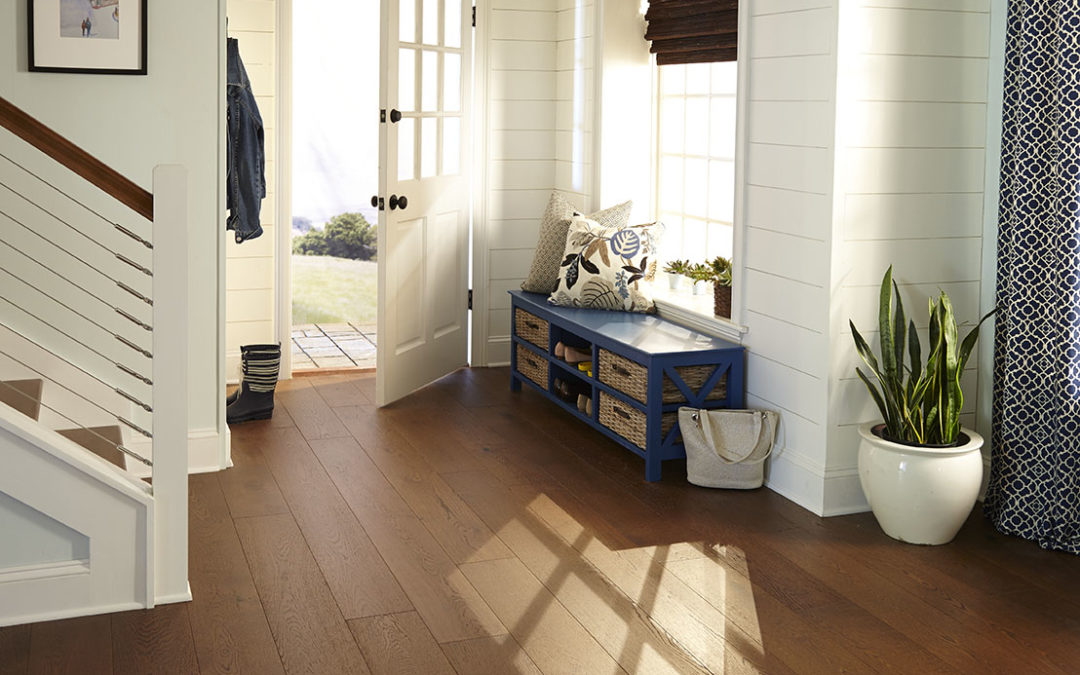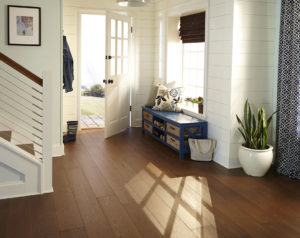If you are a homeowner, you know that personal touches, love, and memories, are really what makes a house a home. For many, this can be as simple as having all of their loved ones at home each night, slumbering under the same roof. For others, it can mean filling the home with priceless memorabilia, collected around the world during their travels. And for others, this can mean the home itself, and working to build a personality within the home that portrays the era of construction and craftmanship that went into building it. Hardwood floors are one of those many home features that can indeed, help a house feel like a home.
Hardwood floors have been commonplace in homes since the late 1800s, and while popularity has waxed and waned throughout the years, it is again on the rise. Flooring is truly the foundation of a home and wall coloring (paint), window treatments, and even furniture choices are often selected based on the style of floor prevalent in your home.
Maintenance for Hardwood Floors
If your home has hardwood floors, you have likely come to know that proper maintenance and cleaning is important to maintain the longevity of the flooring. Here are just a few quick pointers to keep top of mind:
- Sweep or dust your floors daily.
- Vacuum floors at least once per week (more often if you have pets, small children, or wear your shoes in the home) by using a light canister-style vacuum or central vacuum with a hardwood floor attachment. Do not use a standard upright vacuum, as this is far more likely to scuff or scratch your floor.
- Treat your floor with a recommended wood floor cleaner at least once per month.
- Apply a new coat of finish every three to five years (or as suggested by the flooring manufacturer).
- Sand and refinish your flooring once every ten to fifteen years (or as suggested by the flooring manufacturer) Remember, only solid floors can be refinished.
So, do hardwood floors fade?
If your hardwood floors are exposed to sunlight, then you have probably noticed that if you have had a rug in one particular section of the floor for a few years, and later move it or replace it, the floor has faded around the location of the rug. And the longer the flooring is covered, the more noticeable the color change will be.
Wood is extremely photosensitive, and color deterioration in hardwood floors is the result of overexposure caused by:
- Ultra violet (UV) light
- Visible light
- Infrared (IR) light which causes solar heat
How fast your floor will fade or change in color really varies on the type of flooring you have, and the amount of sunlight that it is exposed to. Unfortunately, there really is no easy fix to prevent fading, unless you want to live in a home with your windows covered and shuttered all the time. Since the sun is your best source of vitamin D and we all need vitamin D to absorb calcium and to promote healthy bone growth, and we all know that a dose of sun each day helps us to stay in our happy place, living in a house full of darkness is probably not the right solution.
So, here are some quick suggestions on how to limit extreme floor discoloration:
- Move your rugs and furniture on occasion to help equalize UV and IR light exposure.
- If you aren’t home during the day when the sun is at its brightest, close blinds and draw the drapes (this can also help with energy consumption).
- When finishing your floor, consider a product with a UV inhibitor.
- Apply a window-film, such as one of those offered by 3M to cut down the UV and IR light while still allowing varying degrees of light to enter.
- Install an outdoor awning. This can be great to help offer shade over your deck or patio, and can also help prevent light from getting to your windows, as the light is often blocked by the outstretched awning.
- Install low-E glass windows which have special coatings that can really help limit the amount of UV and IR light that passes through.
Whatever you decide to do, understand that fading is natural, and some homeowners actually feel that the fading over time adds to the charm and character of the home. And remember, before you apply any permanent treatments to your floor or undergo a serious renovation (or even installation of an awning or new windows), be sure to work with a professional contractor, or seek guidance from another home improvement professional.



